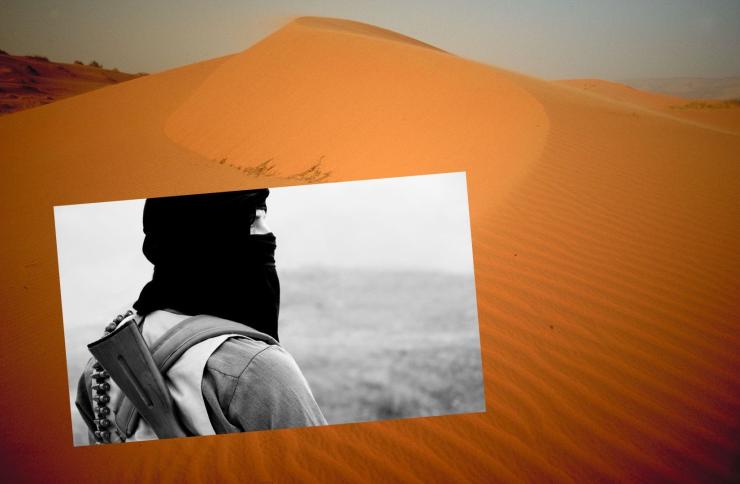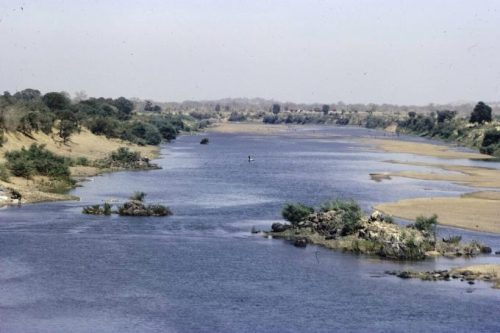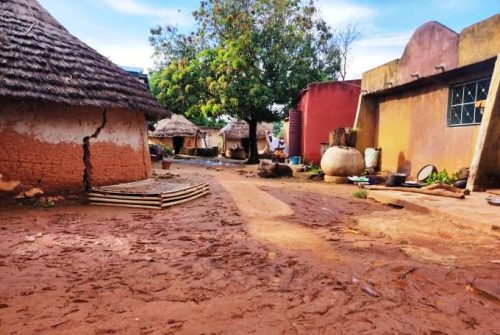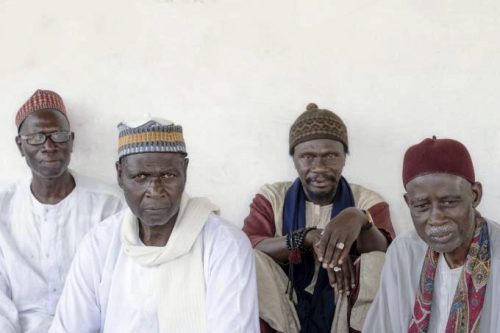Senegal. Goldmines for the Jihadists.

In the regions bordering between Senegal and Mali, the gold rush has created hundreds of artisanal or semi-artisanal mines. A real danger is that the extraction of the precious metal may be used as a source of financing for terrorist groups.
In the Senegalese region of Kédougou, the gold rush begins at first light, when it is not so hot. Near the village of Faranding, the artisanal mine looks like this: a large space of land riddled with holes tens of meters deep, where the miners disappear into the darkness armed with torches and tools. A permanent rumbling of jackhammers and electric generators forms a background noise. There are Senegalese, but also Malians, Burkinabes and Guineans. This region in the southeast of Senegal, one of the poorest in the country, is a great melting pot where men of over 20 nationalities from all over West Africa and the Sahel live and work. They come to try their luck.

The Falémé River with bushes on its banks at the Mali-Senegal border. CC BY-SA 4.0/ Fred P. M. van der Kraaij
In the region bordering Mali and Guinea, there are hundreds of artisanal or semi-artisanal mines. Gold fever has exploded recently. Kédougou, the regional capital has doubled its population, going from 100 thousand inhabitants before 2010 to over 200 thousand today. The gold rush has also attracted foreign businesses. Today there are dozens of companies, both European and Chinese, with industrial and semi-mechanized mines, very often at the expense of the environment and the local population, whose land is illegally stolen.
Faranding is located on the banks of the Falémé River which traces the border between Senegal and Mali. The young miner Aliou Cissé tells us that “It is mainly Malians and Guineans who buy gold from the miners”. The Malian shore is just a few hundred meters away. A wooden boat transports goods from one shore to another without any control. Along the way, you notice a wooden barge with a metal structure on top. From there men operate dredging machines to sift sand from the riverbed. This way of searching for gold is considered completely illegal and it also threatens the environment.
According to complaints from various activists and some NGOs, those who cause the most damage are the mining companies who discharge thousands of litres of water full of chemical substances, such as mercury, into the river. For some time now, the inhabitants of the area have no longer been able to use the water for their livestock or personal consumption. Agriculture has also been compromised.

A view of a village in the Kedougou region. In Kédougou, gold has not brought better living conditions. The poverty rate is 61.9%. iStock/ Alba Perez Enriquez
The context of Faranding represents well the chaotic and precarious equilibrium in which people live in these border territories so important for the stability of Senegal. Analysts say they are worried about the ongoing phenomena. Above all, the expansion of Jihadist extremism which is starting to threaten West African countries from the Sahel.
Kédougou and neighbouring Tambacounda are among the poorest regions despite their economic potential. In Kédougou, gold has not brought better living conditions. The poverty rate is 61.9%. The lack of opportunities generates frustration and a sense of abandonment. Environmental damage “could generate tensions that can be exploited by violent extremists”, explains Paulin Toupane of the Institute for Security Studies (ISS). In his opinion, gold mining in Senegal “is probably used as a source of financing for groups active in Mali.”
In fact, according to some estimates, 90% of the artisanal mined gold ends up in Mali, with which Senegal shares over 250 km of extremely porous borders and where it is impossible to control the flow of buyers and sellers. Senegal has so far been spared terrorist attacks and is considered among the few stable countries in West Africa. However, the gold rush and the development of other illegal trafficking networks have increased Kédougou’s vulnerability. And the jihadist danger could become a reality. The unstable situation in Mali is also worrying, with the military junta in power which, after having broken with Western partners and the United Nations, has adopted military strategies with the help of Wagner’s Russian mercenaries.

Meetings were organized with religious leaders and local authorities to raise awareness against the spread of extremist thought. iStock/ Cultures Studio
For Bakary Sambe, regional director of the Timbuktu Institute in Dakar, the permeability of the borders is the reason why the jihadist groups have not yet orchestrated attacks on Senegalese territory, as «they have spaces for tactical withdrawal and Senegal is strategic. There is the flow of capital, the movement of weapons and access to the sea.”
Despite the strong rooting of moderate Sufi Islam with its brotherhoods that are considered a ‘shiel’” against extremist thought and violence, governments led by Macky Sall have progressively adopted prevention measures. Meetings were organized with religious leaders and local authorities to raise awareness against the spread of extremist thought. Intelligence activity and the presence of security forces have been increased. Infrastructure projects have been launched, including the Emergency Program for the modernization of border axes and territories, launched in 2016 with a budget of over 32 billion CFA francs (approximately 49 million euros). Despite the recriminations of many local representatives, the strategy has so far worked.(Open Photo: 123rf – swm)
Marco Simoncelli



